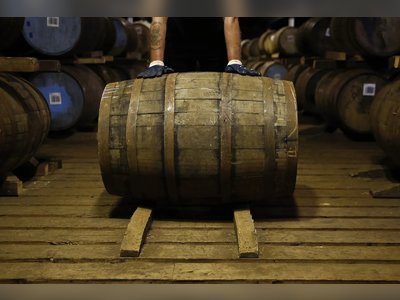
The shaming of Whitehall: how the Partygate scandal unfolded
When the first Mirror front page dropped with a story about two illicit parties in No 10, most MPs and aides were willing to shrug it off. After all, the serious suits working behind the famous black door are not perceived as a party-mad crowd.
Most in Westminster blithely assumed it was a glass of fizz at the desk. One cabinet minister confided at the time that he had shared the dregs of a bottle of whiskey in a near-deserted office with some officials working late just before Christmas, and joked about whether that would see him on the front of the Mirror as well.
But even then, trouble was brewing.
The details in the original story showed events that had clearly broken the rules – around “40 or 50” people were said to have been crammed “cheek by jowl” into a medium-sized room in No 10 for each of the two events.
Now, six months on, as the investigation reaches its conclusion, Whitehall is collectively hanging its head in shame.
The scale of the rule-breaking revealed in Downing Street was astounding – quite unimaginable when that first front page dropped on a Tuesday night in November.
It is now in all likelihood the street which has received the highest number fines for Covid breaches in the land – 127 in total to 83 individuals, for eight law-breaking events. Some officials have received up to five fines.
 A government poster campaign in January 2021.
A government poster campaign in January 2021.
The Partygate scandal – which Boris Johnson looks to have survived by the skin of his teeth – has taken down a number of other careers, and it may yet have the same effect on Whitehall and Downing Street’s reputation as the expenses’ scandal had for MPs and parliament.
It is hard to fathom how the culture developed in the very offices where rules were drafted which banned families holding hands at funerals, saw women give birth alone and kept children apart from their dying parents.
The events involved the same people who signed off publicity campaigns with the pictures of exhausted nurses in PPE and the slogan: “Look her in the eyes and tell her you never bend the rules.”
They were organised by the aides who prepared the briefings for the prime minister and senior officials at nightly press conferences, where the public were repeatedly told that to breach the rules could cost someone their life.
Some of the details of the parties – with more likely to come in Sue Gray’s final report – appear so egregious as to be almost comical.
Invites to “bring your own booze” to the Downing Street garden, suitcases wheeled in full of alcohol, “wine-time Fridays”, a child’s swing broken, “raucous karaoke” with Whitehall’s head of propriety and ethics, and a senior aide DJ-ing in the basement at the leaving do for a spokesperson who now works for the Sun.
For those in Whitehall who worked in other departments, most working at home through the pandemic, the rule-breaking has almost defied belief.
Sources describe a “saviour complex” that spread through civil servants in No 10 during the darkest days of the pandemic, when most of the others in Whitehall were working from home.
“They were working together all day in an office, but it is still hard to understand what they were thinking to allow things to develop as they did,” one civil servant said.
Jill Rutter, a former senior civil servant now at UK in a Changing Europe thinktank, said there were serious questions about the culture emanating from the top which the Gray report is expected to investigate.
“In the civil service you take your lead from senior leadership because it is a hierarchical culture, and that is also a culture set by politicians. If the head of propriety and ethics (Helen Macnamara) was there and it was in the Cabinet Secretary’s Office, you would think well, this is probably all right.
“And when you’re working in quite small environment, and if you’re relatively far down the food chain, it’s very hard to be the one who says: ‘I’m not sure we should be doing this’.”
There is widespread feeling that junior officials have taken the bulk of the fines for the Partygate scandal.
Some civil servants have also found themselves brought into harsher disrepute, a source of sympathy from colleagues, including the Sheffield council chief executive, Kate Josephs, who remains suspended from her job after her leaving do from the Cabinet Office was investigated by police.
The prime minister’s former spokesperson Allegra Stratton is also viewed as having been treated harshly, being forced to resign after a video emerged of her joking about one of the parties.
Political aides such as No 10’s chief of staff, Dan Rosenfield, and head of communications, Jack Doyle, were also casualties – though their departures always seemed to be more related to how the fallout was handled rather than the breaches themselves.
In contrast, the cabinet secretary, Simon Case, appears not to have been fined and others, including the prime minister’s former principal private secretary Martin Reynolds, who organised the BYOB summer party, has been quietly moved to a different post at the Foreign, Commonwealth and Development Office.
There is particular internal opprobrium towards Case, who was described by one Whitehall source as a “submarine” who had offered no leadership or counsel on the multiple hits to civil service morale – including new job cuts and the tabloid crusade against home working.
“People trusted their bosses and they got fined, you’d think someone might acknowledge that at some stage,” one said.
Rutter said a key moment would be what the Gray report concludes about the wider leadership in No 10 and the Cabinet Office.
“The prime minister could be standing up and saying, I just have to take responsibility for the fact that I allowed a culture at the centre of government to develop where a lot of normal, law-abiding people going about their daily jobs got the impression that it was acceptable to have these sorts of events going on – and I’m truly sorry to them. Or you get the senior civil servants standing up and doing the same,” she said.
“For now, they say sorry for the individual things they have done, but nothing more.”











